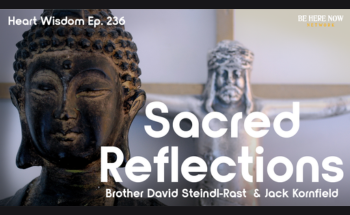True maturation on the spiritual path requires that we discover the depth of our wounds. As Ajahn Chah put it, “If you haven’t cried a number of times, your meditation hasn’t really begun.”
Almost everyone who undertakes a true spiritual path will discover that a profound personal healing is a necessary part of his or her spiritual process. When this need is acknowledged, spiritual practice can be directed to bring such healing to body, heart, and mind. This is not a new notion. Since ancient times, spiritual practice has been described as a process of healing. The Buddha and Jesus were both known as healers of the body, as well as great physicians of the spirit.
Wise spiritual practice requires that we actively address the pain and conflict of our life in order to come to inner integration and harmony. Without including the essential step of healing, students will find that they are blocked from deeper levels of meditation or are unable to integrate them into their lives. Many people first come to spiritual practice hoping to skip over their sorrows and wounds, the difficult areas of their lives. They hope to rise above them and enter a spiritual realm full of divine grace, free from all conflict.
Some spiritual practices actually do encourage this and teach ways of accomplishing this through intense concentration and ardor that bring about states of rapture and peace. Some powerful yogic practices can transform the mind. While such practices have their value, an inevitable disappointment occurs when they end, for as soon as practitioners relax in their discipline, they again encounter all the unfinished business of the body and heart that they had hoped to leave behind.
True maturation on the spiritual path requires that we discover the depth of our wounds: our grief from the past, unfulfilled longing, the sorrow that we have stored up during the course of our lives. As Ajahn Chah put it, “If you haven’t cried deeply a number of times, your meditation hasn’t really begun.” This healing is necessary if we are to embody spiritual life lovingly and wisely. Unhealed pain and rage, unhealed traumas from childhood abuse or abandonment, become powerful unconscious forces in our lives. Until we are able to bring awareness and understanding to our old wounds, we will find ourselves repeating their patterns of unfulfilled desire, anger, and confusion over and over again. Healing can develop in part through a systematic spiritual practice.
Another kind of healing takes place when we begin to bring the power of awareness and loving attention to each area of our life with the systematic practice of mindfulness. The Buddha spoke of cultivating awareness in four fundamental aspects of life that he called the Four Foundations of Mindfulness. These areas of mindfulness are: awareness of the body and senses, awareness of the heart and feelings, awareness of the mind and thoughts, and awareness of the principles that govern life. (In Sanskrit these principles are called the dharma, or the universal laws.) The development of awareness in these four areas is the basis for all of the Buddhist practices of insight and awakening.
This excerpt is taken from the book, “A Path With Heart”






